For many years, wood decks were the most popular option for homeowners, but there are now plenty of alternatives to wood decks that offer even more benefits than their wooden counterparts.
The alternative to plywood decks varied from composite decking boards to metal decking options, there are now many different materials that can be used for decking construction.
In this article we are going to discuss the Cheap yet sturdy and aesthetic alternative to wood decking you can choose:
Cheap Alternative to Wood Decking
If you’re in the market for a new deck but want to avoid the expense and hassle of traditional wood decking, there are plenty of cheap alternatives available.
No matter what type of outdoor space you have, there’s sure to be an affordable alternative to wooden decks that fits your needs. Check these out!
Concrete Decking Boards
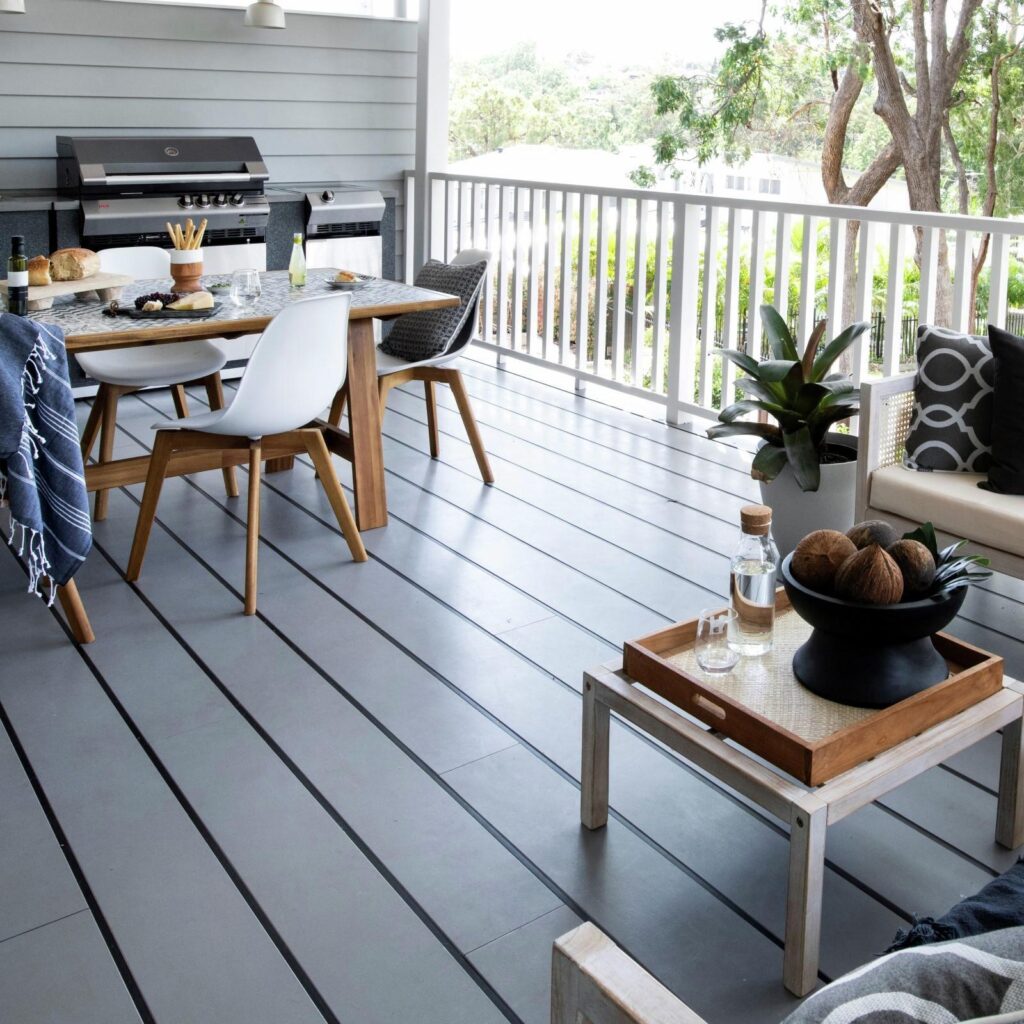
Concrete decking boards are quickly becoming the go-to choice for homeowners looking for an alternative to traditional wood decks.
Not only are concrete boards more durable and long lasting than standard wooden decks, they can also help to create a more stylish and modern look to your outdoor area.
Compared with wooden decks, concrete decking boards offer a variety of advantages.
- Concrete is incredibly strong and resistant to many different weather conditions like sun, rain, snow or hail.
- Additionally, it requires little maintenance over time since it does not rot or warp like wood does when exposed to humidity or moisture.
- This makes it perfect for those who want a low-maintenance outdoor space that can be enjoyed year round without having to worry about any major upkeep tasks like staining or sealing the surface.
Composite Decking

Composite decking consists of wood fibers and recycled plastic that are bound together with a binding agent.
It combines plastic and wood fibers for an attractive, low-maintenance outdoor surface that can resist mold, mildew and fading from UV rays.
Composite decking has many other advantages when compared to traditional decks made of wood.
- It is resistant to rot and insect damage, making it a more durable option.
- It’s easier to install since it doesn’t need additional support, such as footings or railings.
- Additionally, composite decking requires no staining or painting like natural wood does and comes in a variety of colors and styles to fit any home’s aesthetic desires.
- This type of material also reflects heat better than traditional lumber, making it cooler in the summer months while still retaining its integrity during colder weather conditions.
Rice hull decking
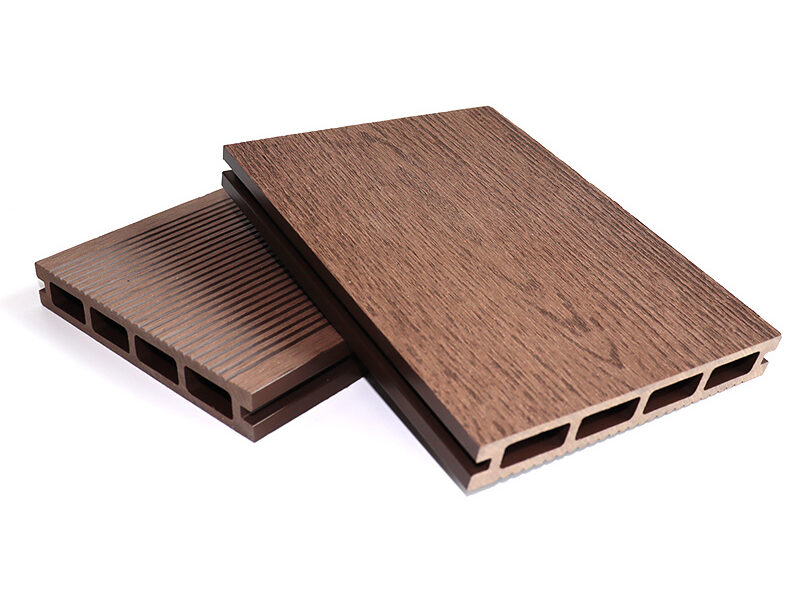
Rice hulls are an environmentally friendly alternative for outdoor decking, offering advantages over traditional wood decks.
Rice hulls come from the outer layers of rice kernels that have been separated during milling.
The husks can be used as an aggregate in concrete, or they can be carbonized, heated at high temperatures to create charcoal and then ground into black granules and mixed with other materials to form composite deck boards.
Here are some advantages of Rice hull decking:
- They are also lightweight, pest-resistant, non-toxic and fireproof – making them the perfect choice for anyone looking for an eco-friendly decking material.
- Rice hull decks are not only environmentally friendly but also low maintenance; they do not need to be sealed or stained like traditional wooden decks.
- Rice hulls are a byproduct of food production and do not require deforestation or intensive farming practices for their cultivation, making them an environmentally friendly source material.
Vinyl decking / PVC Decking

Made from polyvinyl chloride (PVC) and other materials, vinyl decks are durable and low maintenance, making them ideal for homeowners looking for a deck that requires little upkeep.
Unlike wood decks which may need to be sanded and stained every few years, vinyl decking is relatively maintenance free and will not require additional treatments or repairs.
This makes it an especially attractive option for those who want the look of a traditional wood deck without the hassle of painting or staining on a regular basis.
Not only is it designed to last longer than wood, but its construction also minimizes water absorption – meaning it won’t warp or rot like wooden materials do over time.
Bamboo Decking

Bamboo decking is a fast-growing, sustainable alternative to traditional wood decks.
It can be constructed from either whole bamboo stalks or laminated boards, the latter being the most common form used in building new decks.
Bamboo offers many advantages over wood when it comes to building a deck.
- It’s more durable than wood, requiring less maintenance and tending over time—no sealing or painting required!
- Additionally, bamboo is naturally termite resistant; making it an ideal choice for those wanting to avoid potential pest damage.
- The material has impressive load bearing capacity which makes it suitable for high traffic areas around your home as well as damp environments like poolside patios or balconies.
Aluminum Decking
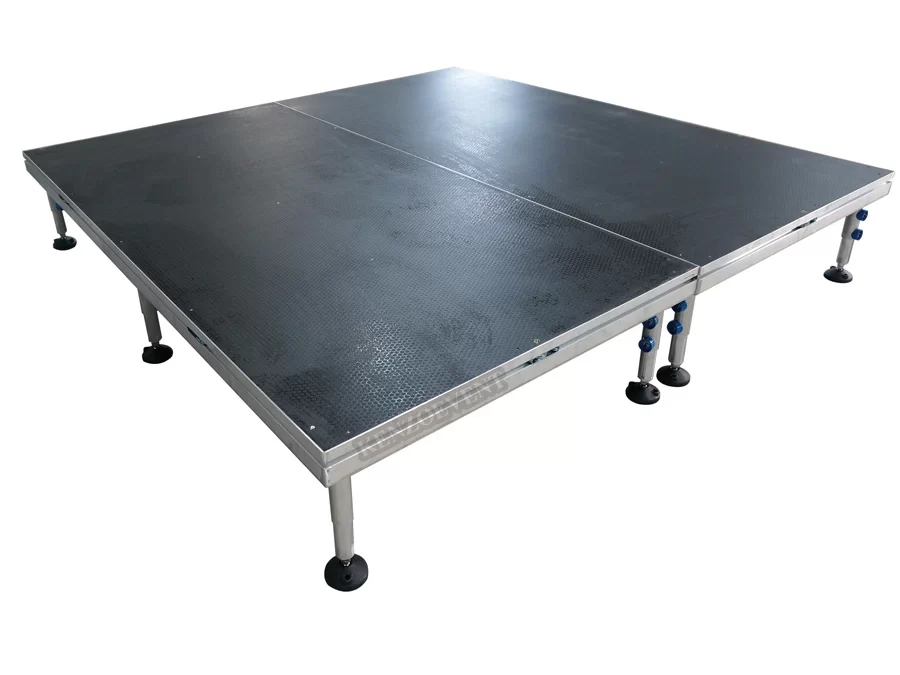
Aluminum decking provides a modern alternative for homeowners looking to upgrade their outdoor living space.
This material is lightweight yet strong – it can support up to twice the weight of a wooden deck without bending or sagging.
It offers many advantages that make it a great choice when building or renovating your deck:
- Unlike wood decks, aluminum decks are impervious to rot and don’t require regular staining or sealing.
- They also resist warping, splintering, cracking, and discoloration due to sun exposure and moisture damage.
- Furthermore, aluminum is non-combustible so you won’t have to worry about fire safety issues like you would with a wooden deck.
Natural Stone And Porcelain
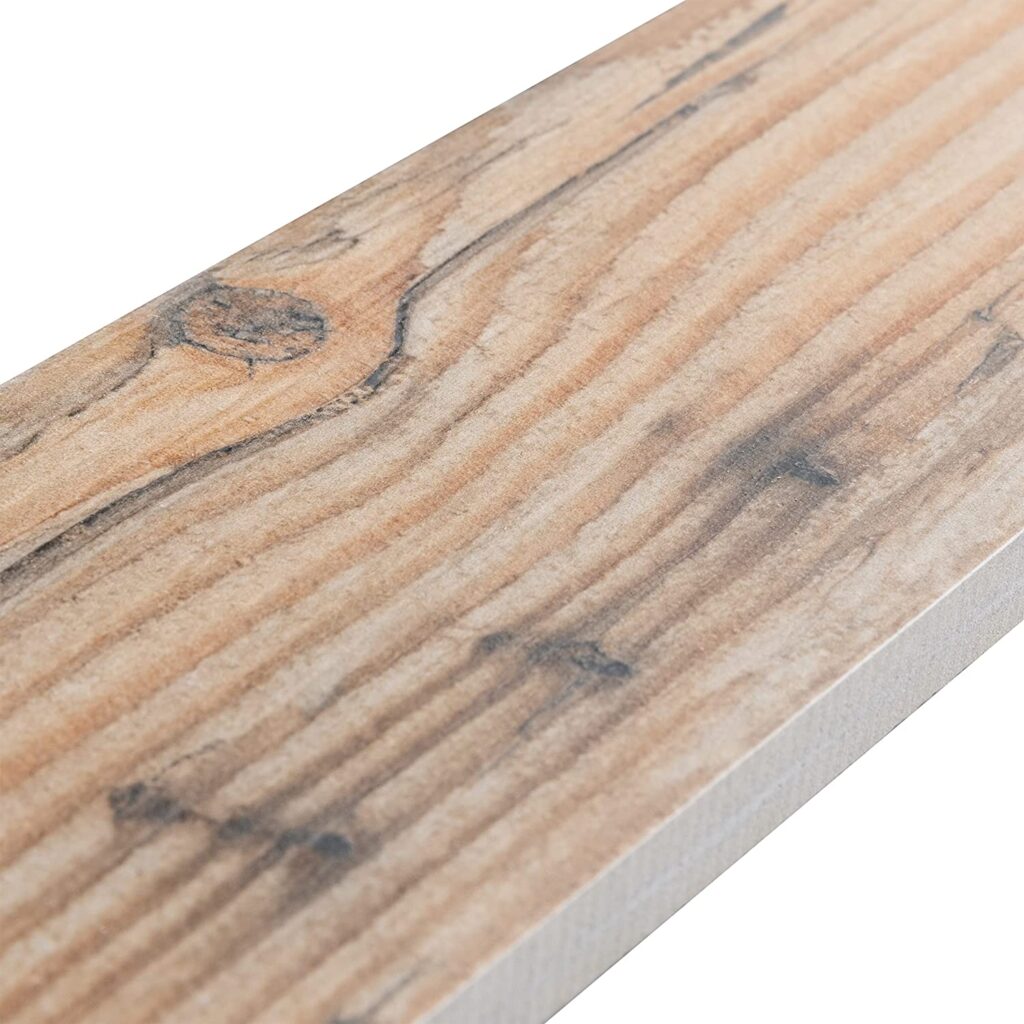
Natural stone and porcelain are two popular alternatives to wood decks. Natural stone is one of the most popular choices for outdoor flooring due to its timeless look and classic beauty.
It is available in several varieties including slate, marble, limestone, travertine and quartzite.
Unlike natural stone, porcelain tiles come in a variety of shapes, sizes, colors, and textures so that you can customize your outdoor space to match your style.
They’re also incredibly low maintenance – never need staining or painting, and are resistant to fading from UV rays or moisture damage due to their high-density material.
The cost of porcelain tile is typically higher than that of wood, but the long-term savings in maintenance makes it worth considering as an alternative when building your outdoor living space.
Poured Concrete – Alternative to raised decking
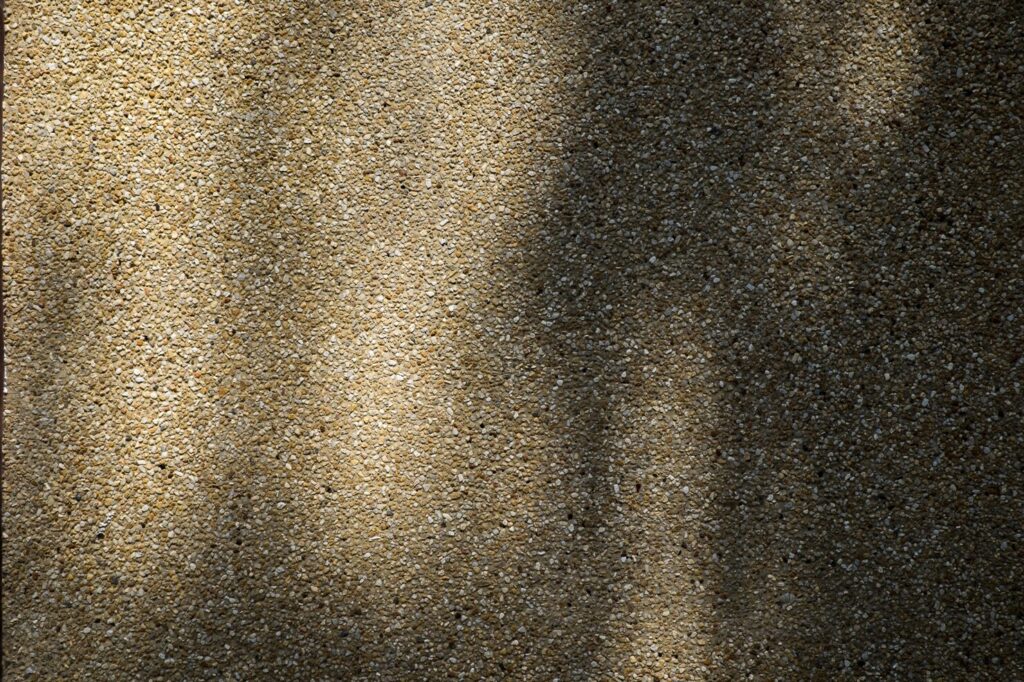
Poured concrete is becoming a popular alternative to traditional wood decks.
With advances in technology, the look and feel of poured concrete can be customized to fit any design style, making it a viable option for homeowners who are looking for alternatives to wood decks.
- The benefits of using poured concrete versus wood decks include its strength and longevity, as well as low maintenance costs over time.
- Poured concrete requires minimal upkeep and can withstand extreme weather conditions without warping or splintering like wooden boards can.
- Additionally, because it does not contain organic material like wood does, there is no risk of insect infestation.
- Plus, when properly sealed with an approved sealant, poured concrete will resist staining from everyday wear and tear much better than wood would.
FAQ: Alternatives to Wood Decks
Can you build a deck directly on dirt?
The answer is yes, but there are several factors to consider first. First, building directly on the ground means that your deck could be more susceptible to moisture damage and insect infestations.
Additionally, the soil could shift over time which would cause your deck to become unsteady or wobbly. You’ll also need to consider any local regulations related to constructing decks in certain areas—some regions require footings and foundations for decks above a certain height.
If you do decide to build directly on top of the dirt, make sure you use pressure-treated wood and fasten it securely with galvanized nails or screws.
Is bamboo decking cheaper than wood?
Yes! Generally speaking, bamboo is less expensive than most hardwood varieties, and it can be purchased pre-fabricated which makes installation easier and more affordable.
However, wood decks may require fewer repairs over time since they are more resistant to wear and tear than bamboo. Additionally, certain types of wood are much cheaper than bamboo despite requiring frequent maintenance to preserve their appearance.
Can I build a deck without digging holes?
Yes, you can build a deck without digging holes. With advancements in technology, there are now several different options for constructing a deck without having to dig into the ground.
One of these options includes using helical piers, which attach to a concrete foundation that is not buried and instead sits flush with the ground. This eliminates the need for digging holes in order to secure the foundation of your deck.
Alternatively, free-standing decks are another option that do not require any type of digging or installation into the ground at all.
These decks are built on top of adjustable supports made from solid PVC material that is strong enough to hold up your entire structure while remaining lightweight and easy to install.
Free-standing decks can be placed anywhere you want and don’t require any kind of excavation or installation into the ground.
What is a floating deck?
A floating deck is a type of deck design that allows homeowners to create an outdoor living space without needing to break ground or pour concrete footings.
It’s a great way to enjoy the outdoors and expand the usable square footage of your home. Floating decks are easy to install, require minimal maintenance, and provide versatile options for homeowners with different budgets, skill levels, and expectations.
Floating decks typically consist of wood boards mounted onto pre-built concrete blocks or piers connected by joists that rest on top of them.
This creates a level surface which can then be used as an outdoor patio or entertainment area. Unlike traditional decks, floating decks don’t require digging holes in your yard or attaching it to your home’s foundation.
Do freestanding decks need footings?
Yes, A footing is a stable foundation that helps provide support for a freestanding deck and prevents it from sinking or shifting over time. Whether your deck requires footings depends on several different factors, including the size and height of the structure, as well as local building codes in your area.
Generally speaking, any freestanding deck measuring more than 18 inches above ground level will require footings. This ensures that the structure is properly supported and can withstand harsh weather conditions without becoming damaged or unsafe.
If your structure does not meet these requirements, you may be able to get away with using concrete blocks instead of traditional footings for added stability and support.
“There is no real ending. It’s just the place where you stop the story.”






